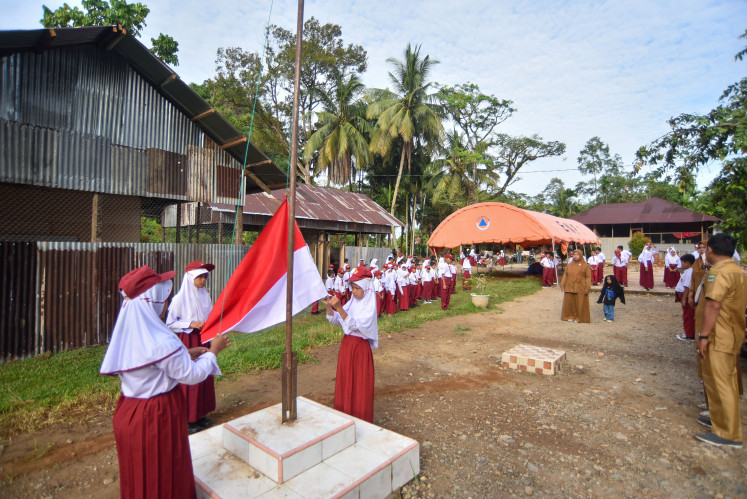Popular Reads
Top Results
Can't find what you're looking for?
View all search resultsPopular Reads
Top Results
Can't find what you're looking for?
View all search resultsProtection from discrimination concerning sex and gender in a plural world
Thailand's health-and-rights-oriented approach should enable transgender persons to access medical care, such as hormone treatment and data protection.
Change text size
Gift Premium Articles
to Anyone
O
n the occasion of International Day against Homophobia, Biphobia and Transphobia (IDAHOBIT) on May 17, United Nations human rights experts recently called for countries to work with LGBTI communities and not to police them. This was an apt message that has to resonate at the national and local levels, especially when the world is witnessing regression in regard to policies on diversity, equity and inclusion.
Among ASEAN member countries, Thailand can be proud of the fact that the country is generally liberal on these issues, although there is no room for complacency. The most obvious progress is the implementation of the right of all persons (from 18 years of age), irrespective of sex or gender, to marry consensually and to shift away from the binary approach of “man/woman equals husband/wife”.
This is a work in progress, as there are some 50 other laws awaiting reform to underline equality and non-discrimination for all. One of the urgent next steps to pluralize actions is to pass a law to recognize a person’s gender identity, which can be different from the sex assigned at birth.
A key difficulty is the language itself. The word “sex” in this context means the biological sex attributed to a person at the time of birth. However, “gender” is different, as it reflects how a person feels and how society interlinks with the person, which can differ from the biological sex.
The correct translation of “sex” is “phet” in Thai, while the word “gender” should be translated as “phet sapap” or “phet pawa”. There is still much confusion between these terms in official documents, including in the medical sector.
This is especially important for transgender people who wish to affirm their gender and change identification, passport and other documents to reflect their self-determination. At present, regrettably, transgender men (individuals born women but self-identifying as men) and transgender women (individuals born men but self-identifying as women) are unable to change their identity on such documents and are disadvantaged accordingly. This is even where they have had surgery to alter their physique to reflect that self-identification.
On another front, there is the issue of intersex persons, namely persons born with particular sex characteristics, such as with both male and female organs. This group is particularly victimized by coerced surgery from a young age, superimposed by others choosing the (imputed) sex for the intersex child. This causes immense harm physically and psychologically, as the child may grow up to self-identify as having a different sex or gender from that resulting from the coerced surgery.
Later in 2025, the UN Human Rights Council will host a special session to discuss the intersex issue directly for the first time.
Currently, there are various draft laws to address both the issue of transgender persons and intersex persons in Thailand’s parliament. There are some constructive elements emanating from them.
First, on the transgender issue, under the draft, a person has to right to affirm the person’s gender without coerced surgery. Second, there is no need for a psychological test for persons to affirm their preferred gender.
Third, the health-and-rights-oriented approach should enable transgender persons to access medical care, such as hormone treatment, and data protection. LGBTI persons should be able to offer blood donations. Fourth, gender markers will no longer be binary (namely, male, female), but there will be a third category of “other” gender.
Concerning intersex persons, the draft stipulates that coerced surgery should not take place at a young age. Families should wait till the person grows up to decide whether or not to have the surgery and let the person decide on the sex or gender accordingly. On the birth certificate, the sex of the person should be stated as “intersex”.
Not everything is settled in the draft, however. A difficult issue is the age of the person for affirming the gender and the age of the person for deciding when and if to have the surgery voluntarily.
There is still disagreement internationally on the issue. The draft in Thailand uses 15 as the minimum age for affirming a person’s identity. Thus, a person would be able to ask for a change of gender on identification documents from the age of 15, while those under 15 need parental consent to do so.
On the intersex issue, a person should be able to decide whether to affirm that person’s sex or gender from the age of 15, and surgery is subject to the person’s consent. All this will depend very much on political leadership to press for the passage of the law.
What about the vagaries of international trends? Should the recent judgment of the Supreme Court of the United Kingdom that “woman” means a biological woman and not a transgender woman, affect Thailand’s approach to sex and gender? That judgment should be viewed in context.
First, the court was interpreting British law on the issue, namely the Equality Act (2010). That law offers protection from discrimination relating to a variety of features, including “sex”, “gender reassignment” and “sexual orientation”. The court was interlinking the word “woman” with the term “sex”; in other words, woman as a biological feature.
Transgender people will still be protected as a group under the notion of “gender reassignment”. However, internationally, the term “gender affirmation” is now preferred to uphold the self-identification or self-determination of persons in this group.
Moreover, the UK has a separate law, the Gender Recognition Act (2004), on the issue of transgender people who wish to change their identity on the basis of gender dysphoria. However, there is a pathological and ambivalent tone behind that classification. The international trend now is to avoid classifying transgender people as having gender dysphoria and to advocate that the issue should be dealt with as part of access to health care and “sexual health”.
Whatever the state of the law here, there or anywhere, there can be no substitute for education and familiarization involving the community, educational institutions, families, politicians and general public to treat others with empathy, irrespective of sex or gender.
There can be no room for hate crimes. The heart and soul of the world is the plurality of its peoples sharing peacefully and respectfully a caring and concerted destiny.
***
The writer is a professor emeritus at Chulalongkorn University and former UN independent expert on sexual orientation and gender identity.











